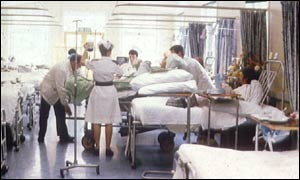| You are in: UK: Politics | ||||||||||||||||||||||||||||||||||||||||||||||||||||||||||||||||||||||||||||||||||||||||||||||||||||||||||||||||||||||||||||||||||||||||||||||||||||||||||||||||||||||||||||||||||||||||||||||||||||
|
Saturday, 2 February, 2002, 20:13 GMT
Unions erupt in public services row

Public-private partnerships in the NHS are controversial
Britain's trade unions have taken an angry swipe at government plans to reform public services after a speech by Transport Secretary Stephen Byers.
Defending the use of private investment to modernise schools and hospitals, the minister said the fight for public services would be a battle between the "reformers and the wreckers". Following his address to Labour's Spring conference in Cardiff Mr Byers said the wreckers included some union leaders and he was ready to take them on.
The angry comments came ahead of Prime Minister Tony Blair's speech to the conference on Sunday, when he is expected to say the reformers must win the modernising battle. Among other top union officials voicing their anger on Saturday was the transport union's Bill Morris. He derided Friday's speech by Home Secretary David Blunkett suggesting ministers were not all powerful and should not take all the blame for failing services. The British people had not elected the government to "hand over our public services to the private sector", he said. Mr Morris said that the private finance initiative (PFI) was "immoral" and would saddle the next generation with enormous debts. Dave Prentis, leader of Britain's biggest union, Unison, accused the "New Labour aristocracy" of getting too close to private companies. Involving private companies in public services would not provide value for money or "deliver one iota of better education or health care", he said.
GMB union leader John Edmonds also argued that ministers should heed the lack of public support for privatising public services. He said that, according to polls, only 11% of Britons supported privatisation of public services "The highest level of support recorded for the poll tax was 14%," Mr Edmonds continued "And as I remember, the poll tax was not a great electoral advantage to the Tory government." The government had "invented, totally unnecessarily, its own poll tax, its own electoral disadvantage, its own imploding policy that is going to drag down its support," Mr Edmonds said.
But he also rejected an expansion of the role of the private sector on ethical grounds. "I support the public services not just because it is the best way to deliver services in common to the whole of our people, but because it has a social and political ethos that we should support," Mr Edmonds concluded.
Health Secretary Alan Milburn later defended public-private partnerships (PPPs) in the National Health Service. "When we go to the electorate we will be judged on not where people have been treated, but whether they have been treated," he told delegates. "Where we can use the private sector for the benefit of the public sector and public services, that is what we should do." 'Failed' privatisation In his keynote speech, Mr Byers called comparisons between the Conservatives' privatisation of the rail network and the Labour government's plans for PPPs "wrong and misleading". He also ruled out compensating Railtrack shareholders with taxpayers' money and insisted the government was right to seize control of the troubled company. "Public services come first and not the interests of Railtrack shareholders," Mr Byers said. Putting the company into administration had been the inevitable consequences of a "failed" privatisation, he continued. And Mr Byers was warmly applauded when he added that "despite all the sound and fury, the personal criticism", he was in no doubt the government had been right to take control.
And it had been responsible for an unacceptable level of delays. "Now the Tories have joined the call for compensation to be paid to Railtrack shareholders, £1bn of taxpayers' money to be provided," Mr Byers continued. "My position is absolutely clear and resolute on this. "There will be no more taxpayers' money made available."
|
See also:
02 Feb 02 | UK Politics
01 Feb 02 | UK Politics
01 Feb 02 | UK Politics
04 Dec 01 | Health
01 Oct 01 | Labour
06 Sep 01 | ppp
09 Sep 01 | UK Politics
03 Sep 01 | ppp
Internet links:
The BBC is not responsible for the content of external internet sites |
||||||||||||||||||||||||||||||||||||||||||||||||||||||||||||||||||||||||||||||||||||||||||||||||||||||||||||||||||||||||||||||||||||||||||||||||||||||||||||||||||||||||||||||||||||||||||||||||||
|
|
 |
||
| ----------------------------------------------------------------------------------
To BBC Sport>> | To BBC Weather>> | To BBC World Service>> ---------------------------------------------------------------------------------- © MMIII | News Sources | Privacy |